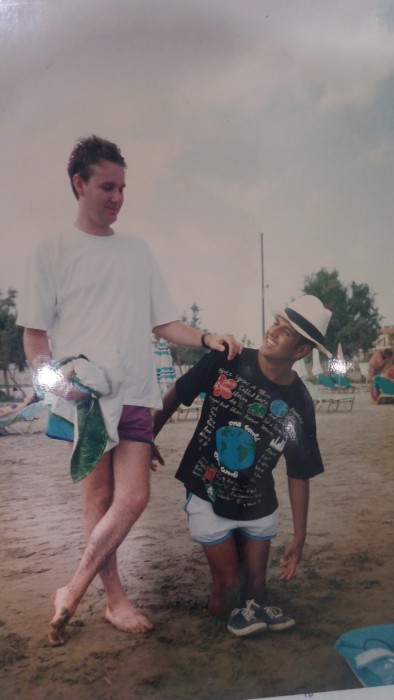11th November 2015 Chennai, India
My Pal Ralph

The tall bloke on the right is my best friend Ralph Chapman (obviously I’m not quite that short nor, unfortunately, that young). We’ve known each other since we were 3 and together at Nursery (when I spoke mostly Gujarati), and best mates since we were about 8 when I was forcibly separated from Michael Mowbray (sorry Mike) because we were too chatty.
We were at the same schools until he left Grammar School at 16 to become an engineer through the apprenticeship route. The reason I mention him is that (a) I may never get the chance in another blog and (b) I’ve been thinking about him in the last couple of weeks in the context of the historic visit to the UK by Prime Minister Modi from 12 November.
Here’s why. In 1992, after I graduated I came to India for 4 months – forgive the cliche -to “find myself”. I had an amazing visit across the country, as well as quality time with my extended family in Mumbai who remain incredibly close to me and an important part of my life. But I also remember being disturbed when I visited parts of the country where there were mixed memories of the colonial past, particularly in the North of the country.
On my return, I was best man at Ralph’s sister’s wedding. We were having a drink after the wedding breakfast and I talked about my trip and how, while I would always be very, very proud to be British, I found it hard to reconcile myself to her colonial legacy. As I listed some of the things I’d seen and heard, Ralph listened patiently. When I finished, he looked me in the eye and said “Yeah, but it wasn’t me”.
And therein lies the challenge. Like all long-standing partnerships – I often liken it to a marriage – there’s a massive amount of shared history and experience that inevitably colours the perceptions of the relationship, even for those that, like me, were born in the UK and proudly serve her interests. It’s driven by the stories that our families have passed down about their personal experiences under the Raj; about the histories we read and the films we see. It’s driven by the stories that guides tell the millions of British tourists to India at the Red Fort or Srirangapatnam which tell some of, but not the whole, story.
And it’s also true, I think, that perceptions of the UK amongst Indians are very different too, not least thanks to Bollywood and the regional cinemas. I’m often surprised that many of the people I meet seem to think of a UK of old that I too often don’t recognise.
Just as India has changed since 1947, the UK has changed beyond recognition too, not least because of the influence that Indian origin Brits – who form the largest diaspora at around 1.4 million – have had on the country, particularly following World War II. It’s fundamentally not the same UK of the East India Company or the 1857 Rebellion or of Jallianwala Bagh.
It is the country in which curry is more popular than fish and chips. A country which believes in India so much that it has invested in its biggest diplomatic network – including by opening in January 2015 the first Diplomatic Mission in Ahmedebad – anywhere in the world at a time of general belt-tightening across the civil service. A country which welcomed the Ugandan Asians to its shores when they were expelled by the appaling Idi Amin. A country which is the biggest investor into India, and whose companies employ around 691,000 people across India, about 1 in 20 of all organised private sector jobs – and spend around 4.4% of profits on CSR activity, more than twice the legal requirement. A country which has had an Indian origin cricket captain in Nasser Hussain (who was incidentally born in Madras), as well as a slew of actors – including Katrina Kaif, Government Ministers, business leaders and artists. And the odd Ambassador, of course.
That’s the UK that I know, believe in and am honoured to represent. And that’s the UK that we’ll be showcasing to the Indian Prime Minister – a fellow Gujarati – over the next few days. It’s a visit that will take the bilateral relationship to a new level. You can read what Narendra Modi wants to get out of his visit on his Facebook page.
That’s the best Diwali present that those of us who care about the relationship could wish for. Happy Diwali to you and your families, with very best wishes for a prosperous and healthy New Year.
Lovely! It puts things into perspective and explains so much to us.
Dear Mr.Bharat Joshi,
We are proud on u as a person and as a family member of ours…
UK is lucky for the person having like u and India as well that you are british deputy high commissioner of chennai….god bless